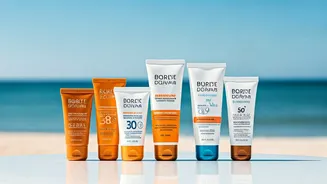Importance of Sunscreen
Sunscreen is a crucial element of skincare, offering protection against the sun's damaging ultraviolet (UV) rays. These rays, including UVA and UVB, are significant
contributors to skin aging, sunburn, and an increased risk of skin cancer. In India's environment, where sun exposure is considerable, the consistent application of sunscreen is especially important. Regular use helps to shield the skin, preventing premature aging such as wrinkles and dark spots, while also reducing the likelihood of developing serious conditions like melanoma. Choosing a broad-spectrum sunscreen, which guards against both UVA and UVB rays, is highly recommended to ensure comprehensive protection. Incorporating sunscreen into a daily routine, regardless of the season, is essential for maintaining skin health and minimizing sun-related damage, ensuring the skin remains healthy for an extended period.
Sunscreen No. 1: Broad-Spectrum Protection
The first recommendation is a sunscreen known for its broad-spectrum protection. This sunscreen is specifically formulated to defend the skin from both UVA and UVB rays. UVA rays penetrate deep, leading to signs of aging, while UVB rays primarily cause sunburn. The dermatologist highlights that this sunscreen often contains ingredients like zinc oxide and titanium dioxide, which act as physical blockers reflecting the sun's rays. In addition to providing comprehensive protection, it's often preferred for its suitability for sensitive skin. Its non-greasy texture makes it ideal for daily use, ensuring it can be comfortably worn under makeup or on its own. The dermatologist emphasizes the importance of applying this sunscreen liberally, especially before venturing outdoors. Reapplication every two hours, or more frequently if swimming or sweating, is also recommended to maintain optimal protection against the sun's harmful effects.
Sunscreen No. 2: Lightweight Formulas
The second sunscreen on the list is appreciated for its lightweight formula, making it a great option for daily use, particularly in the humid Indian climate. The dermatologist points out that these sunscreens are often oil-free and designed to be easily absorbed into the skin without leaving a greasy residue. This feature makes it suitable for individuals with oily or acne-prone skin, who may find heavier sunscreens uncomfortable. This type of sunscreen typically contains chemical filters like avobenzone or octinoxate that absorb UV rays. While effective, the dermatologist advises that users must apply these sunscreens generously and reapply them frequently. A lightweight texture ensures ease of application and comfortable wear throughout the day. The absence of a heavy feel ensures that the sunscreen does not clog pores, a common concern for people with acne. This makes it an ideal choice for protecting the skin without causing breakouts.
Sunscreen No. 3: Water-Resistant Qualities
The third sunscreen is highlighted for its water-resistant properties, which are particularly beneficial for those who engage in outdoor activities or spend time near water. This feature ensures that the sunscreen remains effective even after swimming or sweating. The dermatologist clarifies that water resistance is typically indicated on the product label and that it does not mean the sunscreen is entirely waterproof. However, these sunscreens often provide a reliable level of protection during activities where water contact is probable. These sunscreens frequently utilize a blend of physical and chemical filters to provide broad-spectrum protection. It is recommended to reapply the sunscreen every two hours or immediately after swimming or excessive sweating. These sunscreens are essential for individuals leading active lifestyles. The dermatologist also emphasizes the significance of choosing a water-resistant sunscreen with a high SPF (Sun Protection Factor) to maximize sun protection.
Sunscreen No. 4: For Sensitive Skin
The fourth sunscreen recommended by the dermatologist is tailored for individuals with sensitive skin. This sunscreen is often formulated without common irritants like fragrances, parabens, and certain preservatives that can trigger allergic reactions. The dermatologist stresses the importance of patch-testing any new sunscreen on sensitive skin before applying it to the entire face. Typically, sunscreens suitable for sensitive skin use physical blockers such as zinc oxide and titanium dioxide. These ingredients are considered gentle and less likely to cause irritation. The dermatologist suggests carefully reading the label and choosing products labeled as hypoallergenic or specifically designed for sensitive skin. Choosing the appropriate sunscreen can help protect the skin from sun damage, while minimizing the risk of adverse reactions, making it an essential part of a skincare regimen for those with easily irritated skin. Frequent reapplication is critical to ensure ongoing protection.
Sunscreen No. 5: Combination Skin Types
The fifth sunscreen the dermatologist recommends is designed for combination skin, a common skin type in which the skin exhibits both oily and dry areas. This type of sunscreen usually provides a balance of hydration and oil control, making it ideal for those with different needs in different parts of their face. These sunscreens typically incorporate ingredients like hyaluronic acid for hydration and mattifying agents to manage excess oil production. The dermatologist advises that individuals with combination skin must choose a sunscreen that does not further clog the oily areas, while hydrating the drier parts of the face. Sunscreens for combination skin often come in a lightweight, non-comedogenic formula. Applying the sunscreen evenly to all areas of the face, while focusing on areas that may be oilier, will help maintain a balanced and protected complexion. Consistent usage is crucial to protect the skin from sun damage and to maintain a healthy appearance.












